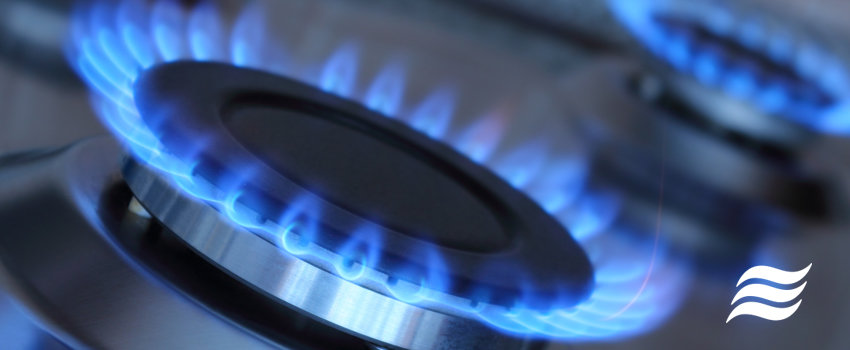
Gas Leaks and How to Prevent Them
If you think you have a leak it’s too late to stop it now – leave the house immediately and call the gas company.
Gas leaks are no joke. If you smell gas in your home right now – leave your home and CALL THE GAS COMPANY RIGHT NOW!
Ok, now that’s out of the way – if you want to be proactive and prevent a gas leak, here are some tips.
How Common Are Gas Leaks?
Technically, a gas leak risk exists wherever gas appliances are being used.
If you use natural gas or propane for appliances like furnaces, cooktops, ovens, water heaters, and clothes dryers, it’s in your best interest to add gas leak prevention into your maintenance routine or to sign up for a professional maintenance plan.
If you use gas, it’s essential to install carbon monoxide (CO) detector(s) in your home in strategic locations. These detectors can pick up on CO levels at 70 parts per million (PPM). If your home has these levels of carbon monoxide, it is considered unsafe for infants, young children and the elderly. At a level of 70PPM, you can already be experiencing symptoms like headache, dizziness and fatigue.
While CO detectors can alert you to dangerous levels of carbon monoxide, they do not detect raw fuel or fumes from propane/methane/natural gas leaks.
Gas leaks are more common than you might think and we see them every week.
A lot of people have gas leaks in their homes for years and it goes undetected due to lack of proper maintenance and CO detectors.
Most leaks could be avoided or caught early with routine maintenance checks.
How To Prevent A Gas Leak
1. Maintain your HVAC system semi-annually
Safety is a vital component of preventative maintenance.
During our maintenance inspections, we always test for gas and carbon monoxide (CO) leaks as part of the procedure. This will find any obvious problems right away.
What Happens During a Professional Gas Leak Test?
Professional HVAC maintenance tasks to avoid gas leaks include:
- Fuel line connections inspection and tightening any connections that have come loose
- Testing manifold gas pressure to make sure the correct amount of fuel is reaching the burners
- Ensuring a tight seal on the blower access door
- Making sure all electrical connections are tight
- Examining wiring for rust and corrosion
- Checking that the pilot or electronic ignition is functioning properly
The most important test undertaken during a routine inspection is the analysis of the combustion gases.
This is the only test that will truly identify if your system is operating safely. Examining the heat exchanger for corrosion, cracks or separations is essential. During this test, a combustion analyzer is carefully inserted into the flue pipe of your gas heating appliance. Readings on the device will let us know if proper combustion is taking place and that gas levels are within safe limits.
CO leaks are dangerous because CO is highly toxic and harmful to breathe. Natural gas and propane can explode and also cause CO leaks as well. When an appliance isn’t getting enough gas due to a leak, it could cause an imbalance in the combustion process and produce more CO than its able to vent off. We can’t state enough how dangerous this is.
A lot of the time, gas leaks show up in highly vented areas, like your attic, so you won’t be able to smell the gas indoors. Even if you can’t smell the gas, the leak is still dangerous. Any spark can ignite the fumes. There is a flame in your furnace and it could be close enough to the fumes to start a fire.
Please read our blog on gas equipment maintenance and the signs of CO poisoning for more information.
2. Check for leaks yourself
When someone calls our office, we tell them to turn off all the gas appliances and locate the gas meter. Look at the dials – if the meter is spinning then gas is passing through and leaking somewhere along the way to the appliance.
After you’ve turned off the gas, if the meter is spinning and you can’t locate a leak, leave your home and call the gas company.
If you are suspicious of a gas leak or not, this is a test you can perform periodically. If nothing is wrong the gas meter dials will not be moving.
3. Replace old gas fittings
If the gas line piping system is past its lifetime (we’re talking corroded and scaled fittings, rust and cracks on your gas pipes), it’s probably a good time to replace the gas line fittings and pipe.
Don’t take this job on yourself have a professional like Nichols and Phipps do this work. The job involves turning off the gas and replacing old fittings with new ones. Once you replace the system with new fittings, it’s necessary to test with leak detectors and a simple soap test.
Don’t forget it’s not as easy as changing a lightbulb! If this is done wrong, it can be a fatal mistake.
We always recommend doing this step if you replace your furnace. We always replace old gas fittings when we install a new furnace – this is common practice at Nichols and Phipps.
4. Replace the old gas shutoff valve
On every furnace there’s a gas shutoff valve. This can also become corroded and faulty over time, so don’t overlook it.
Whenever we replace a furnace, we replace this shutoff valve, but you may want to consider replacing it even if you’re not getting a new furnace in the near future If you’re not sure how old the shutoff valve is, replace it anyhow, it’s very inexpensive and provides good piece of mind. A general rule of thumb –if you can’t turn it off with a wrench then replace it.
Gas leaks are no joke – take them seriously
Sometimes you can do everything right and still have a gas leak. Even when a HVAC installer does a perfect job and everything looked great and was inspected, a leak is still possible and does happen.
Gas parts and components get old and corrode. No matter what you do, don’t underestimate gas leaks because the prevention is so cheap to do.
Our Advice
- Have your equipment inspected and proactively maintained
- Don’t do DIY work on gas-powered appliances – many licensed HVAC companies in our area avoid working on them, and they have professional training. Call us, we love working on boilers, furnaces and heat pumps.
- Install CO detector(s) near vents (ceiling or high on the wall) and within 5 ft of the gas-powered appliance. We sell and install professional grade detectors.
- While you are thinking about it, check your fire alarm batteries and see if it is time to update your fire extinguishers (yes, they expire).
When it comes to gas safety, you can never be too cautious. Set up an inspection of your system(s), call our office on (703) 670-8519.
If you'd like long-term peace of mind, you can sign up for our Comfort Club Membership. It includes twice-yearly maintenance on your heating and cooling system, plus many other bonus discounts. To find out more, get in touch today.
Check out our other blogs for some great HVAC advice:
- Monthly Guide To HVAC Maintenance
- The 5 Biggest HVAC Myths
- How to Get Your AC Read For Summer After A Long Winter
- Pet Owners! Get More Life Out Of Your HVAC Unit With These 6 Tips
- Gas Leaks and How to Prevent Them
- How to Remove Humidity From Your Home
- Signs of a Damaged Furnace Heater
- 5 Biggest HVAC Myths
- 5 Tips For Spring Cleaning Your HVAC System
